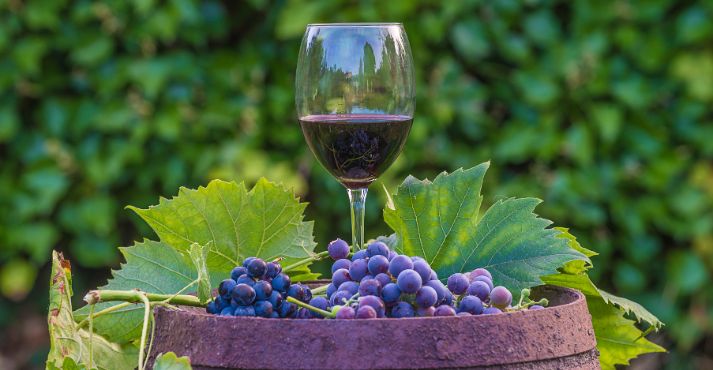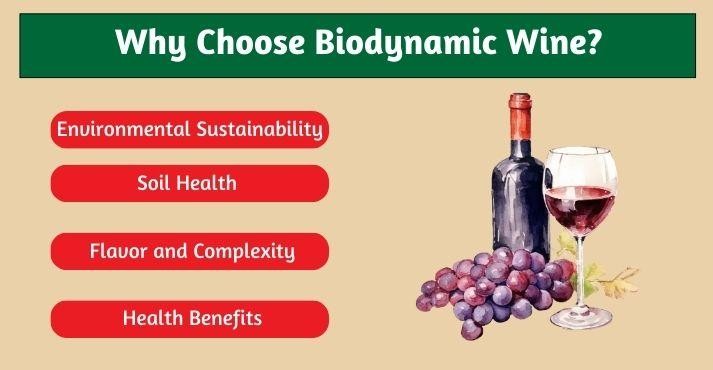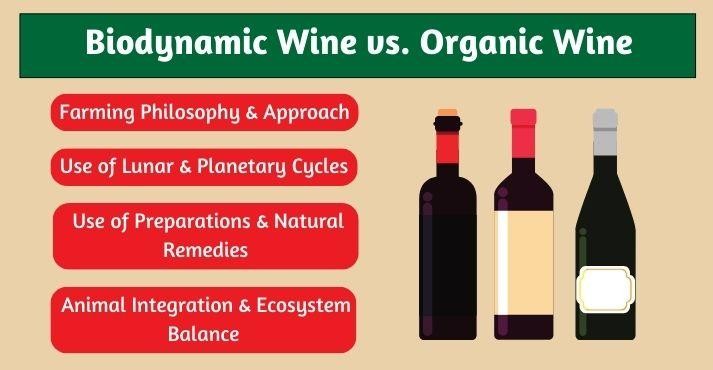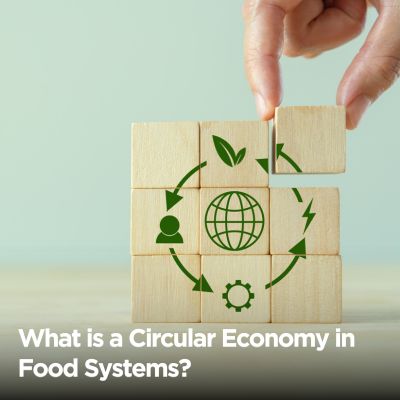Have you ever heard of wine made with the help of the moon and stars? This might sound magical, but it’s a big part of biodynamic wine’s uniqueness.
Biodynamic wines are made in vineyards that grow the best possible grapes by following nature’s timing, like the moon’s phases.
But what is biodynamic wine exactly? It’s a type of wine made using a unique approach called biodynamic viticulture, where everything in the vineyard works together like a balanced ecosystem.
Think of a biodynamic vineyard as its little world, where each plant, animal, and insect has a role. The winemakers follow practices that support nature instead of using chemicals.
This unique method means that biodynamic wineries create wines with unique and deep flavors, making them exciting for wine lovers to try!
What is Biodynamic Wine?

Simply put, biodynamic wine is organic wine grown and made uniquely. In biodynamic vineyards, the winemakers use nature-friendly methods that avoid synthetic chemicals and pesticides.
Instead of adding harmful substances to the land, they use natural preparations to keep the soil healthy and vibrant.
This approach started in the 1920s with an Austrian philosopher named Rudolf Steiner. He believed that farms should work with nature, not against it. His ideas spread, and today, many biodynamic wineries follow his teachings to create wines that reflect the land they come from.
Biodynamic wine is magical for many people because it’s crafted with care and respect for the Earth.
Biodynamic Approach to Winemaking

The biodynamic approach to winemaking has some very unique steps. Here are the main parts that make biodynamic wineries different:
1. Holistic Farming
Holistic farming means seeing the whole vineyard as one extensive, connected system. Everything – the soil, plants, animals, and even insects – plays an integral part in a biodynamic vineyard. This creates a balanced environment where each part supports the others.
So, instead of only caring about the grapes, biodynamic viticulture cares about everything in the vineyard, like the plants and animals that make it healthy.
For example, some biodynamic wineries let sheep graze in the vineyard. The sheep eat the grass, controlling the weeds without needing harmful sprays.
Their droppings also act as a natural fertilizer, helping the soil stay rich and full of nutrients. This is how holistic farming makes the whole vineyard healthier.
2. Lunar and Planetary Cycles
One of the most fascinating aspects of biodynamic wine is how the moon and stars are part of the growing process. Just as the moon affects the ocean’s tides, biodynamic farmers believe it also affects how plants grow. For example:
- Fruit Days are considered best for picking grapes because they’ll have the most flavor.
- Root Days are when winemakers focus on pruning since it’s believed to strengthen the roots.
- Leaf Days are suitable for watering plants and helping vines grow lush and green.
These schedules are based on lunar cycles and are a big part of biodynamic viticulture. Farmers believe this cosmic timing makes the vineyard healthier and the wine tastes better. Hence, the above-discussed wine terms came into being.
Many biodynamic wineries in Southeast Asia use this calendar to guide their vineyard care, bringing a touch of the universe into their winemaking.
3.Biodynamic Preparations
In biodynamic viticulture, specific herbal and mineral preparations keep the soil and plants healthy. These preparations are made from natural ingredients like herbs and animal manure. One popular preparation is 500.
It’s made by filling a cow horn with manure, burying it in the soil for a few months, then digging it up and spreading it on the field.
Other preparations use herbs like chamomile and nettle, known for their healing properties. This practice helps the soil get the nutrients it needs to grow vigorous, healthy vines that produce flavorful grapes.
These natural additions are a big part of biodynamic vineyards and are believed to bring out unique tastes in the wine.
4. Animal Husbandry
Animals are essential in biodynamic farming. Many biodynamic wineries have sheep, chickens, or even cows on their land. These animals help keep the vineyard balanced without pesticides or chemical fertilizers.
For example, chickens may eat insects that could harm the vines, while sheep help with weed control by grazing.
This approach, called animal husbandry, keeps the vineyard naturally healthy. In a biodynamic vineyard, animals are treated as part of the system and are respected for the balance they bring to the land.
The use of animals is one reason why biodynamic wines are considered unique and in harmony with nature.
Benefits of Biodynamic Wine

Biodynamic wine offers numerous potential benefits, especially for those who value eco-friendly and naturally made products. Here are some of the main reasons why people appreciate biodynamic wines:
1. Environmental Sustainability
Biodynamic vineyards are dedicated to maintaining a healthy relationship with the environment.
Unlike conventional vineyards that may use synthetic chemicals, biodynamic farming avoids these substances, focusing instead on natural methods that benefit both the vineyard and its surroundings.
By prioritizing natural balance and biodiversity, biodynamic viticulture helps create a sustainable ecosystem where plants, animals, and soil work together seamlessly.
In a biodynamic vineyard, you won’t find pesticides or synthetic fertilizers. Instead, winemakers rely on herbal and mineral preparations to nourish the soil, creating a natural way to grow grapes. These methods help to reduce pollution and promote cleaner air and water.
Additionally, biodynamic wineries in Southeast Asia, where the impact of farming on the environment is significant, benefit from these sustainable practices by supporting local biodiversity, protecting native plants, and ensuring the vineyard’s long-term health.
This sustainable approach is similar to what’s used in other environmentally conscious winemaking practices.
2. Soil Health
One of the primary focuses in biodynamic viticulture is soil health. In a biodynamic vineyard, the soil is treated as a living system that needs to be healthy for the plants to thrive.
Instead of using synthetic fertilizers, which can harm the soil in the long run, biodynamic farmers apply natural preparations made from herbs and minerals.
These preparations work to enrich the soil, creating a balanced ecosystem where nutrients are preserved and replenished naturally.
Healthy soil is essential for solid vines and high-quality grapes. In biodynamic vineyards, these preparations add essential nutrients to the soil and help create a thriving environment where natural processes care for plant health.
For instance, many biodynamic wineries in Southeast Asia have noticed that their soils remain vibrant and productive even after years of continuous farming.
By treating the soil carefully, biodynamic viticulture allows vineyards to maintain their fertility and resilience, leading to better-tasting grapes and wine.
3. Flavor and Complexity
One of the standout features of biodynamic wine is its unique and complex flavor. Since biodynamic winemaking aims to create a balanced ecosystem, many believe that the wine captures a true sense of the land.
Biodynamic vineyards are known for producing wines with deep flavors, often with earthy or mineral notes that reflect the vineyard’s natural characteristics.
Many wine enthusiasts appreciate biodynamic wines for these complex flavors, which can vary from one vineyard to another based on factors like soil health, plant biodiversity, and farming methods.
For example, biodynamic wines are increasingly popular in Singapore for their bold and expressive flavors. Wine lovers in the region often enjoy how biodynamic wines convey each vineyard’s unique “personality” and minerality, allowing them to experience a taste that feels close to nature.
Many people find that biodynamic wines offer a taste experience unlike any other, as they reflect the vineyard’s soil, air, and overall environment.
4. Health Benefits
Biodynamic wine can be an excellent option for those who prefer a more natural choice. Because biodynamic vineyards avoid harmful chemicals, there’s a reduced risk of pesticide exposure and synthetic additives.
This makes biodynamic wines a cleaner option, especially for health-conscious people. Since these wines are made with minimal processing, they retain more natural compounds in grapes, such as antioxidants and other beneficial substances that may positively affect health.
Additionally, biodynamic viticulture emphasizes balance in the vineyard and the final product. This means biodynamic wines often have fewer artificial additives and preservatives, making them gentler on the body than conventionally produced wines.
Many Southeast Asians turn to biodynamic wines as a cleaner, more natural option. The lower levels of synthetic substances make biodynamic wine popular, especially for wines that align with a healthier lifestyle.
Biodynamic Certification and Standards
Achieving biodynamic certification involves a meticulous process that adheres to stringent standards set by organizations like Demeter.
Let’s delve into the significance of this certification in ensuring the authenticity and quality of biodynamic wines.
Biodynamic Certification Process
Biodynamic certification isn’t granted lightly. Winemakers undergo a comprehensive process that scrutinizes their adherence to biodynamic principles. This includes assessing practices related to lunar cycles, herbal preparations, and holistic vineyard management.
Demeter Standards for Wines
Demeter, a leading certification body, sets the standards for biodynamic agriculture, including winemaking. These standards cover everything from soil fertility to pest management, ensuring a holistic and sustainable wine production approach beyond traditional organic practices.
Ensuring Quality in Biodynamic Winemaking
Adherence to Demeter standards isn’t just a checkbox; it’s a commitment to quality. Biodynamic winemakers believe that their practices respect the environment and contribute to the wines’ unique character and flavor profile.
Authenticity Through Certification
The certification process is a vital aspect of maintaining authenticity. The Demeter label on a bottle signifies a wine crafted with a deep understanding of nature’s interconnectedness and a commitment to sustainable practices.
Quality Assurance for Consumers
For consumers, the Demeter certification provides assurance. It shows that the wine in their hands is more than just a product; it’s the outcome of a thorough winemaking process that respects the Earth’s natural cycles.
Biodynamic Wine vs. Organic Wine

Biodynamic, organic, and natural wines are committed to avoiding synthetic chemicals and promoting environmentally friendly practices, but some essential distinctions set them apart.
While both types of wine aim to be sustainable and health-conscious choices, biodynamic viticulture goes a step further, incorporating unique methods and principles to create a holistic and harmonious vineyard environment.
Let’s dive into the differences to see how each approach impacts the wine, the land, and the winemaking process.
1. Farming Philosophy and Approach
The primary difference between organic and biodynamic vineyards lies in their philosophy. Organic wine focuses on eliminating synthetic chemicals and pesticides, replacing them with natural alternatives to protect the vines.
The main goal is to keep the grapes free from harmful substances, creating a more sustainable vineyard that aligns with organic farming standards. Organic winemaking practices emphasize environmental care but don’t always consider the entire vineyard ecosystem.
The focus remains on the vines and soil, with less attention paid to the roles of animals, plants, and other elements contributing to the vineyard’s balance.
In contrast, biodynamic viticulture takes a broader view. Biodynamic wineries see the vineyard as a complete ecosystem where every element is interconnected.
Instead of focusing only on the health of the grapes and soil, biodynamic farmers consider the vineyard a self-sustaining system involving plants, animals, soil, and even cosmic forces like the lunar and planetary cycles.
This approach is rooted in Rudolf Steiner’s teachings. In the 1920s, Steiner founded biodynamic farming, believing cosmic energy and natural rhythms could improve farm health and crop quality.
In a biodynamic vineyard, this translates to practices that support the entire ecosystem, creating a natural balance that promotes long-term sustainability and a stronger connection to nature.
2. Use of Lunar and Planetary Cycles
Another key difference is the influence of the lunar and planetary cycles in biodynamic wine production.
While organic winemaking does not consider these cycles, biodynamic farmers believe that the moon’s phases and planetary positions can affect plant growth, soil quality, and grape flavor.
The biodynamic calendar is divided into “Fruit Days,” “Root Days,” “Flower Days,” and “Leaf Days,” each of which is associated with specific activities in the vineyard:
- Fruit Days: Ideal for harvesting grapes, as they are believed to be at peak flavor.
- Root Days: Best for pruning, helping to strengthen the plant’s roots.
- Flower Days: Reserved for leaving the vineyard undisturbed, allowing the vines to grow naturally.
- Leaf Days: Suitable for watering, as it supports the growth of the vine’s leaves.
These cycles guide many biodynamic wineries in their daily operations, ensuring that each process step is aligned with nature’s rhythms.
This cosmic approach is unique to biodynamic farming and adds a layer of care and timing that goes beyond the practices typically seen in organic farming.
For example, many biodynamic vineyards in Southeast Asia strictly follow this calendar, believing it improves the wine’s quality and flavor, giving it a natural vibrancy.
3. Use of Preparations and Natural Remedies
Both organic and biodynamic wines avoid chemical fertilizers and pesticides, but biodynamic viticulture takes it further with special “preparations” that promote soil health and vine growth.
These preparations are made from natural ingredients like herbs, animal manure, and minerals, which are fermented and applied to the vineyard in specific ways.
For example, Preparation 500 involves filling a cow horn with manure, burying it in the soil over winter, and then using it as a spray to enrich the vineyard. Other preparations include chamomile, nettle, and yarrow, all adding nutrients and supporting a balanced ecosystem.
Organic farming may use compost and natural fertilizers but doesn’t require these specific preparations. Biodynamic preparations are unique because they enhance vitality and foster a balanced, thriving vineyard ecosystem rather than simply adding nutrients.
This difference reflects the biodynamic approach, which treats the vineyard as a “living” entity where the soil, plants, and organisms work together.
These preparations are believed to boost the flavor and complexity of biodynamic wines, giving them a unique profile that reflects the health and harmony of the vineyard.
4. Animal Integration and Ecosystem Balance
Biodynamic wineries often include animals in the farming system, creating a more integrated ecosystem. In a biodynamic vineyard, animals such as sheep, chickens, or cows play an active role in maintaining the land.
Sheep, for instance, graze on weeds, reducing the need for herbicides, while chickens help control pests. This use of animals supports a healthier vineyard and enriches the soil naturally with organic matter, adding to the vineyard’s balance.
This level of ecosystem integration is rare in organic vineyards, where the focus remains on plant health rather than a balanced, interconnected farm system.
Organic farms may still use natural weed and pest control methods but do not always involve animals. Biodynamic viticulture is distinct in its focus on animals’ role, viewing them as essential partners in sustaining a healthy vineyard ecosystem.
This approach creates a more diverse and resilient environment, which is believed to produce richer, more expressive wines.
Conclusion
So, what is biodynamic wine? It’s a wine produced with a solid commitment to nature, where every element in the vineyard functions together in a balanced, integrated system.
Biodynamic wineries focus on creating a balanced ecosystem, using natural cycles, preparations, and animals to support healthy grape growth.
This approach helps the environment and results in unique flavors that tell a story of the land where the wine was made.
For anyone who values sustainability and the natural world, biodynamic wine offers a taste of what’s possible when winemaking works with, not against, nature.





























